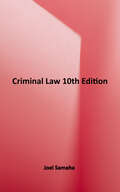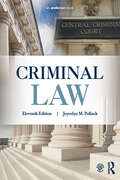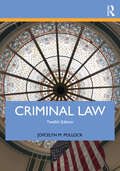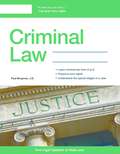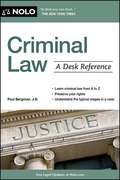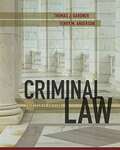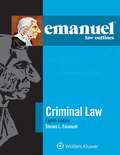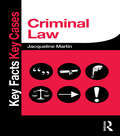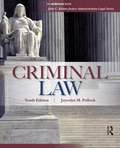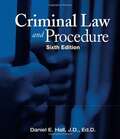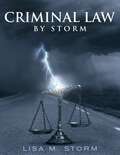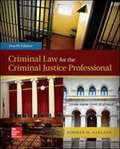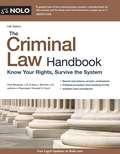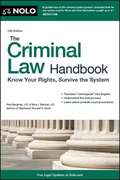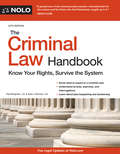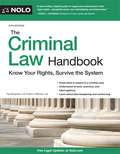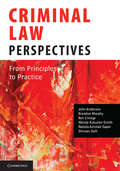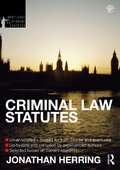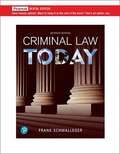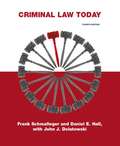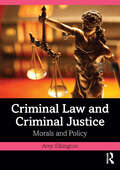- Table View
- List View
Criminal Law
by Joel SamahaUp to date and easy to understand, Joel Samaha's best-selling CRIMINAL LAW, 10e applies criminal law's enduring foundations and principles to fascinating court cases and specific crimes. The book offers a balanced blend of case excerpts and author commentary as it illustrates the principles, defenses, and elements of crime at work.
Criminal Law
by Joycelyn M. PollockCriminal Law, Eleventh Edition, a classic introduction to criminal law for criminal justice students, combines the best features of a casebook and a textbook. Its success over numerous editions, both at community colleges as well as in four-year college criminal justice programs, is proof this text works as an authoritative source on criminal law as well as a teaching text that communicates with students. The book covers substantive criminal law and explores its principles, sources, distinctions, and limitations. Definitions and elements of crimes are explained, and defenses to crimes are thoroughly analyzed. Each chapter offers guidance to help students understand what is important, including chapter outlines, key terms, learning objectives, Legal News boxes that highlight current criminal law issues, and Quick Checks that cue the reader to stop and answer a question or two concerning the material just covered. Unique Exploring Case Law boxes offer guidance in using the accompanying cases, which are provided on the book’s website. A robust collection of instructor support materials addresses teaching and learning issues
Criminal Law
by Joycelyn M. PollockCriminal Law, Twelfth Edition, a classic introduction to criminal law for criminal justice students, combines the best features of a casebook and a textbook. Its success over numerous editions, both at community colleges as well as in four-year college criminal justice programs, is proof this text works as an authoritative source on criminal law, as well as a teaching text that communicates with students. The book covers substantive criminal law and explores its principles, sources, distinctions, and limitations. Definitions and elements of crimes are explained, and defenses to crimes are thoroughly analyzed. Each chapter offers guidance to help students understand what is important, including chapter outlines, key terms, learning objectives, Legal News boxes that highlight current criminal law issues, and Quick Checks that cue the reader to stop and answer a question or two concerning the material just covered. Unique Exploring Case Law boxes offer guidance in using the accompanying cases, which are provided on the book’s website and in Part II of this textbook. A robust collection of instructor support materials addresses teaching and learning issues. Updated with all the newest relevant law, this book is appropriate for undergraduate students in criminal law and related courses.
Criminal Law
by Paul BergmanDemystify criminal law. Criminal law can be a maze of conflicting principles, strange jargon, and confusing procedures. Professor Paul Bergman unravels the mysteries with an engaging plain English style that incorporates real life examples, famous films, and entertaining hypotheticals. From arraignment through sentencing, from "abuse excuse" to vigilante, this handy desk reference explains it all. You'll get answers to questions such as: * When can police officers enter your home? * Is cyber bullying illegal? * Is intoxication ever a criminal defense? * What are the "fruits of the poisonous tree"? * Can the police search your car? Criminal Law: A Desk Reference will assist students, bloggers, journalists, mystery writers, and anyone else interested in the criminal justice system or law enforcement.
Criminal Law
by Paul Bergman J.D.Take the mystery out of criminal law Criminal law can be a maze of conflicting principles, strange jargon, and confusing procedures. Professor Paul Bergman unravels the mysteries with an engaging plain-English style that incorporates real-life examples, famous films, and entertaining hypotheticals. From arraignment through sentencing, from "abuse excuse" to vigilante, this handy desk reference explains it all. You'll get answers to questions such as: When can police officers enter your home? Is cyber-bullying illegal? Is intoxication ever a criminal defense? What are the "fruits of the poisonous tree"? Can the police search your car? Criminal Law: A Desk Referencewill assist students, bloggers, journalists, mystery writers, and anyone else interested in the criminal justice system or law enforcement. Paul Bergman is a UCLA Professor of Law and the author or coauthor of many books, including Represent Yourself in Court and The Criminal Law Handbook, both published by Nolo.
Criminal Law
by Thomas J. Gardner Terry M. AndersonThomas J. Gardner is a proven author and widely respected practicing attorney with more than fifty years of experience, including several years as an assistant district attorney in Milwaukee, Wisconsin. Mr. Gardner received his law degree from Marquette Law School.
Criminal Law (Emanuel Law Outlines): Eighth Edition
by Steven EmanuelThe most trusted name in law school outlines, Emanuel Law Outlines were developed while Steve Emanuel was a student at Harvard Law and were the first to approach each course from the point of view of the student. Invaluable for use throughout your course and again at exam time, Emanuel Law Outlines are well-correlated to all major casebooks to help you to create your own outlines. Sophisticated yet easy to understand, each guide includes both capsule and detailed explanations of critical issues, topics, and black letter law you must know to master the course. Quiz Yourself Q&As, Essay Q&As, and Exam Tips give you ample opportunity to test your knowledge throughout the semester and leading up to the exam. Every title in the series is frequently updated and reviewed against new developments and recent cases covered in the leading casebooks. Emanuel Law Outlines provide a comprehensive breakdown of the law, more sweeping than most, for your entire study process. For more than thirty years, Emanuel Law Outlines have been the most trusted name in law school outlines. Here s why: Developed by Steve Emanuel when he was a law school student at Harvard, Emanuel Law Outlines became popular with other law students and spawned an industry of reliable study aids. (Having passed the California bar as well, Steve Emanuel is now a member of the New York, Connecticut, Maryland, and Virginia bars. ) Each Outline is valuable throughout the course and again at exam time. Outline chapters provide comprehensive coverage of the topics, cases, and black letter law covered in the course and major casebooks, written in a way you can easily understand. The Quiz Yourself Q&A in each chapter and the Essay Q&A at the end provide ample opportunity to test your knowledge throughout the semester. Exam Tips alert you to the issues that commonly pop up on exams and to the fact patterns commonly used to test those items. The Capsule Summary an excellent exam preparation tool provides a quick review of the key concepts covered in the course. The comprehensive coverage is more sweeping than most outlines. Each Emanuel Law Outline is correlated to the leading casebooks. Every title is frequently updated and reviewed against new developments and recent cases covered in the leading casebooks. Tight uniformity of writing style and approach means that if you use one of these guides, you can be confident that the others will be of similar quality.
Criminal Law (Key Facts Key Cases)
by Jacqueline MartinKey Facts Key Cases: Criminal Law will ensure you grasp the main concepts of your Criminal Law module with ease. This book explains the facts and associated case law for: the important concepts of actus reus, mens rea and strict liability the main fatal and non-fatal offences against the person a wide range of property offences general defences the topics of participation and inchoate offences Key Facts Key Cases is the essential series for anyone studying law at LLB, postgraduate and conversion courses. The series provides the simplest and most effective way to absorb and retain all of the material essential for passing your exams. Each chapter includes: diagrams at the start of chapters to summarise key points structured headings and numbered points to allow for clear recall of the essential points charts and tables to break down more complex information Chapters are also supported by a Key Cases section which provides the simplest and most effective way to absorb and memorise essential cases needed for exam success. Essential and leading cases are explained The style, layout and explanations are user friendly Cases are broken down into key components by use of a clear system of symbols for quick and easy visual recognition
Criminal Law (Tenth Edition)
by Joycelyn M. PollockThe book combines the best features of a traditional law casebook with those of a textbook that helps students learn how to identify the issues and holdings from court decisions.
Criminal Law (University Casebook Series)
by Peter W. Low John Calvin Jeffries Richard J. Bonnie Anne M. CoughlinFocuses on the major topics in criminal law, including the federal insanity defense.
Criminal Law 1: Law of Crimes
by P. Jaganathan Usha Jaganathan J. P. ArjunThe book "Criminal Law 1: Law of Crimes" provides a comprehensive overview of the Indian Penal Code (IPC) of 1860, addressing its various amendments and important recent case laws. Authored by P. Jaganathan and co-authors, the book is designed to aid law students and practitioners with its clear, student-friendly language and thorough coverage of the syllabus. It includes solved problems, previous university questions, and detailed explanations of key sections, offences, and punishments under the IPC. The book is structured to cater to the needs of students preparing for law examinations and competitive exams, making it a valuable resource for understanding criminal law in India.
Criminal Law And Procedure
by Daniel E. HallAuthoritative, comprehensive, and current, Criminal Law and Procedure, 6th edition delivers cutting-edge coverage of every aspect of the law and the duties a paralegal is expected to perform. It strikes the ideal balance between theoretical law and cutting-edge developments as it explores foundational concepts as well as emerging trends such as cyber crime, new laws stemming from the Patriot Act, terrorism, and more.
Criminal Law And Procedure
by Daniel E. HallAuthoritative, comprehensive, and current, Criminal Law and Procedure, 6th edition delivers cutting-edge coverage of every aspect of the law and the duties a paralegal is expected to perform. It strikes the ideal balance between theoretical law and cutting-edge developments as it explores foundational concepts as well as emerging trends such as cyber crime, new laws stemming from the Patriot Act, terrorism, and more.
Criminal Law By Storm
by Lisa M. StormCriminal Law By Storm begins with the foundations of law and the legal system, then extensively explores criminal laws and defenses using general state and federal principles, the Constitution, and the Model Penal Code as guidelines. This engaging and interactive textbook will enhance your ability to be successful in academics or a career in law, criminal justice, or paralegal. Lisa M. Storm, Esq. has taught at the community college, four-year, and graduate levels since 1992. Currently, she is a tenured faculty member in Administration of Justice at Hartnell College, a California Community College. She is also an attorney and licensed member of the California State Bar.
Criminal Law For The Criminal Justice Professional
by Norman M. GarlandCriminal Law for the Criminal Justice Professional, authored by criminal justice expert Norman M. Garland, provides a comprehensive study of the rules and laws that encompass the structure of the criminal justice system. The 4th edition gives a wide-ranging overview of the nature, origins, and purposes of the criminal justice system, affording students a thorough understanding of this complex subject matter. The Connect course for this offering includes SmartBook, an adaptive reading and study experience which guides students to master, recall, and apply key concepts while providing automatically-graded assessments. <P><P>
Criminal Law Handbook, The
by Paul Bergman Sara J. BermanCriminal law in plain English. The criminal justice system becomes increasingly complex each year with new laws affecting legal processes. The Criminal Law Handbook explains every part of a criminal case including: - arrests - booking - preliminary hearings - charges - bail - arraignment - search and seizure - plea bargains - sentencing - juveniles The revised edition covers the latest changes in criminal law, including U.S Supreme Court cases. Written by the authors of Represent Yourself in Court, Paul Bergman, J.D. and Sara Berman, J.D.
Criminal Law Handbook, The
by Paul Bergman J.D.Criminal law rules and procedures, explained in plain English. The criminal justice system becomes increasingly complex each year as new laws and decisions can change legal standards dramatically. And at a time when even law enforcement is being affected by hiring freezes and budget cuts, the result is fewer resources and public programs for those accused of crimes, and their friends and families. That's why it's crucial that you have access to clear and complete explanations of all aspects of criminal law and procedure. The Criminal Law Handbook answers your questions about every part of a criminal case, from cops to crooks. Find out everything you've ever wanted to know about how the system works, and the how and why police, lawyers and judges doing what they do. It covers: arrests booking preliminary hearings charges bail courts arraignment search and seizure defenses evidence trials plea bargains sentencing juveniles, and "crimespeak," the language commonly used in criminal statutes. The revised 12th edition covers all new Supreme Court rulings, as well as completely updated, meticulously researched changes to case law and new information on domestic violence law.
Criminal Law Handbook, The: Know Your Rights, Survive the System
by Paul Bergman Sara J BermanThe criminal justice system is complicated, understand it and your rights Criminal law is full of complex rules and procedures, but this book demystifies them. It explains how the system works, why police, lawyers, and judges do what they do, and—most important—the options for suspects, defendants, and victims. It also provides critical information on working with a lawyer. In plain English, The Criminal Law Handbook covers: search and seizure arrest, booking, and bail Miranda arraignment plea bargains trials sentencing working with defense attorneys common defenses constitutional rights juvenile court preliminary hearings appeals, and public defenders This edition is completely updated, covering the latest changes in criminal and U.S Supreme Court cases. Written by the authors of Represent Yourself in Court, Paul Bergman, J.D. and Sara Berman, J.D.
Criminal Law Handbook, The: Know Your Rights, Survive the System
by Paul Bergman Sara J. BermanThe criminal justice system is complicated, understand it and your rights Criminal law is full of complex rules and procedures, but this book demystifies them. It explains how the system works, why police, lawyers, and judges do what they do, and what suspects, defendants, and prisoners can expect. It also provides critical information on working with a lawyer. In plain English, The Criminal Law Handbook covers: search and seizure arrest, booking, and bail Miranda rights arraignment plea bargains trials sentencing working with defense attorneys common defenses constitutional rights juvenile court preliminary hearings appeals, and public defenders victims’ rights This edition is completely updated, covering the latest Supreme Court rulings.
Criminal Law Perspectives: From Principles to Practice
by John Anderson Ben Livings Shireen Daft Brendon Murphy Wendy Kukulies-Smith Natalia Antolak-SaperCriminal Law Perspectives: From Principles to Practice is an engaging introduction to the criminal law in New South Wales, Victoria, the Australian Capital Territory and the Commonwealth Criminal Code. It takes a comparative approach to the law in these jurisdictions, focusing on prevalent summary offences, substantive federal offences and criminal procedure. Complex concepts are explained and contextualised by linking them to practical applications. Each chapter is supported by tools for self-assessment: review questions; case boxes summarising and extracting key historical and contemporary cases; and longer, narrative end-of-chapter problems that promote student engagement and help students develop problem-solving skills and independent thinking. Criminal Law Perspectives explores the development of criminal law principles in Australia, and provides a comprehensive and accessible overview of criminal law for students studying in the area for the first time.
Criminal Law Statutes 2012-2013 (Routledge Student Statutes)
by Jonathan Herring‘Focused content, layout and price - Routledge competes and wins in relation to all of these factors’ - Craig Lind, University of Sussex, UK ‘The best value and best format books on the market.’ - Ed Bates, Southampton University, UK Routledge Student Statutes present all the legislation students need in one easy-to-use volume. Developed in response to feedback from lecturers and students, this book offer a fully up-to-date, comprehensive, and clearly presented collection of legislation - ideal for LLB and GDL course and exam use. Routledge Student Statutes are: • Exam Friendly: un-annotated and conforming to exam regulations • Tailored to fit your course: 80% of lecturers we surveyed agree that Routledge Student Statutes match their course and cover the relevant legislation • Trustworthy: Routledge Student Statutes are compiled by subject experts, updated annually and have been developed to meet student needs through extensive market research • Easy to use: a clear text design, comprehensive table of contents, multiple indexes and highlighted amendments to the law make these books the most student-friendly Statutes on the market Competitively Priced: Routledge Student Statutes offer content and usability rated as good or better than our major competitor, but at a more competitive price • Supported by a Companion Website: presenting scenario questions for interpreting Statutes, annotated web links, and multiple-choice questions, these resources are designed to help students to be confident and prepared.
Criminal Law Today (Fourth Edition)
by Frank Schmalleger Daniel E. Hall John J. DolatowskiThe fourth edition of Criminal Law Today presents a comprehensive, accessible, and up-to-date introduction to the basics of criminal law. The text provides students with the tools and information they need to gain an understanding of the fundamental nature of law, general legal principles, the historical development of criminal law, and its form and function in American society today. Key features are case excerpts that illustrate important legal themes in the context of the chapter topics.
Criminal Law and Criminal Justice: Morals and Policy
by Amy ElkingtonCriminal Law and Criminal Justice: Morals and Policy goes beyond the traditional criminal law textbook and invites students to question why we criminalise certain behaviour and whether the decisions made by the courts can be justified according to legal principle, morals and policy.Providing an overview not only of the legal doctrine of criminal law, but also of the underpinning theory behind the legal doctrine, the book encourages critical thinking around the context behind, and implementation of, legal decisions. It applies this to current issues, such as respect for personal autonomy, prevention of domestic abuse and discouraging gang activity, whilst providing a clear overview of the law relating to actus reus, mens rea, property offences, homicide, non-fatal offences, sexual offences, accessorial liability, and defences. Using hypothetical scenarios, students will develop an understanding of why certain rules exist and then be able to critically analyse why certain behaviour is criminalised. An in-depth study of several key cases will show how the rules and theory play out in practice, and students will examine how morals and policy have influenced these decisions.Featuring thinking points as well as further reading suggestions, this textbook is suitable for all students of criminal law, as well as for those studying jurisprudence.
Criminal Law and Its Administration (6th edition)
by Fred E. Inbau James R. Thompson James B. Zagel James P. ManakCriminal Law and Its Administration is designed specifically for criminal justice courses and sequences of courses covering both substantive and procedural criminal law. It uses the casebook method of instruction. It affords the opportunity for discussions as to the wisdom of the law as it now exists and the direction into which it may, or should be headed. Materials are presented in three parts: substantive criminal law, basic concepts regarding proof of guilt, and legal limitations upon law enforcement practices.
